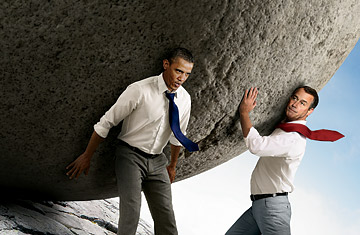
For one of the world's most watched buildings, the White House is remarkably easy to sneak into. On the afternoon of Sunday, July 3, while reporters scribbled down the details of President Obama's early return from a family vacation at Camp David — short sleeves, smiles at a rope line — no one noticed the bronzed man with the nicotine-stained fingers slipping in the side door. According to his public schedule, House Speaker John Boehner was spending the holiday weekend with his family and friends. Instead, he huddled with the President on a small, secluded patio, built for Ronald Reagan, near the Oval Office, where the two men continued the most important conversation of the year.
Among Obama's senior staff, Boehner's arrival was treated as a "tight hold," a special status offered to the most politically sensitive guests: spooks, pollsters and candidates seeking Supreme Court nominations. No announcements. No lines of sight from the Ellipse. Boehner didn't even tell his top deputies, who had been busy drumming the partisan no-new-taxes war cries in their home districts. He was, after all, crossing into enemy territory. That would become a problem soon enough.
The tale of the secret talks between Barack Obama and John Boehner is the story of a political system that has largely ceased to function and yet may be the prelude to something even worse. Lawmakers must work out a package of spending cuts and revenue increases that will permit the Treasury to keep paying its bills through August and beyond. If they fail, the government will lose its ability to meet its obligations — including paying soldiers their salaries and seniors their pensions — ensuring an economic meltdown at home and a crippling loss of faith in the U.S. in financial markets overseas. That would be an unprecedented fiasco.
But it is also the story of two self-described dealmakers in a town where dealing is often a synonym for surrender, who ran up against the limits of their roles, their powers and their colleagues. Boehner and Obama have gotten credit for thinking big and working to overhaul outdated economic policies. But they waited too long to start, in part because they didn't take the time to get to know each other years ago. They also misjudged their armies: they rode out to rescue the country, only to watch many of their followers run for the hills.
The Courtship
It is a measure of just how dysfunctional American politics has become that on the night in 2010 when Republicans won control of the House, the White House did not have a good telephone number to reach the new Speaker-elect. Until that moment, Obama's aides had apparently never felt the need to talk to Boehner, and as a consequence, they never bothered to put him on speed dial or figure out how to find him in a hurry. It fell to a Democratic National Committee staffer to call a fishing buddy, who as it happened was Boehner's new media director. The fishing buddy, in turn, passed along how to reach Boehner so Obama could call with election-night congratulations.
From the start, the partnership was not exactly promising; the two men are like sausage and Sancerre. Boehner, one of 12 children, grew up tending his father's bar. He spent nine years putting himself through college by working full time as a janitor. Obama was born in Hawaii, barely knew his dad, went to two Ivy League schools and was teaching law before he was 32. Boehner made his money in plastics; for Obama, it was his best-selling memoirs.
In Washington, where every other politician can survive by scoring political points, Boehner and Obama did not have that luxury. In April the two men averted a government shutdown with just one hour to spare, crafting a $1 trillion stopgap spending bill for the rest of the year that included $38.5 billion in cuts. Boehner was a skilled and patient negotiator, holding up the White House day after day until he got closer to the deal he wanted. But when it turned out later that there were nearly as many bookkeeping gimmicks as real cuts in the deal, Boehner's freshman class lost some faith in his ability to deliver on their demands.
